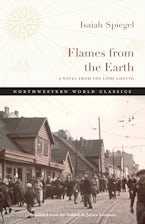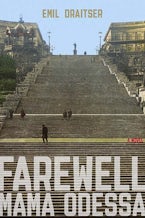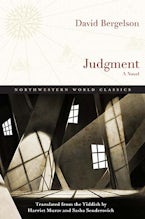FICTION / Jewish
Showing results 1-7 of 7
Filter Results OPEN +

The Curators
Violence haunts 1915 Atlanta and so does the golem a group of girls creates
Flames from the Earth
Flames from the Earth is an autobiographical novel by Isaiah Spiegel, one of the most revered Yiddish authors to survive the Holocaust, depicting the complex web of relationships in and around the Łódź Ghetto.
From the Jewish Provinces
This book highlights a brilliant and nearly forgotten voice in Yiddish letters. The collected stories, spanning Austro-Hungary and New York City, depict young women looking for love and desire in a world that spurns them.
Farewell, Mama Odessa
A highly praised new tragicomic novel by prolific writer Emil Draitser, Farewell, Mama Odessa follows the voyage of Soviet Jewish refugees who leave Odessa, Ukraine, to settle in the US.
The Essential Fictions
Isaac Babel: The Essential Fictions is a collection of seventy-two of Isaac Babel’s finest short stories and includes Red Cavalry, Odessa Stories, and the “Dovecote” cycle. Newly edited, translated, and annotated by Val Vinokur, this collection also features illustrations by Babel’s fellow Odessan Yefim Ladyzhensky.
Judgment
Judgment (Mides-hadin in Yiddish) is a work of startling power by David Bergelson, the most celebrated Yiddish prose writer of his era. Born in Ukraine in 1884, and living in Berlin from 1921 until Hitler’s rise to power, Bergelson was executed in Moscow in 1952. This novel interweaves Judaism and socialism in a revolutionary, experimental, modernist style.
King of Odessa
In 1936 Isaac Babel returned to Odessa, his hometown, and to this day the only record of his last visit home is contained in letters and postacrds from the writer to his sister and mother. In King of Odessa, Robert A. Rosenstone imagines a version of this visit, including fictionalized accounts of Babel's personal relationships, the Great Purges, and other political events and imagines the "lost novel" Babel wrote during those weeks. Throughout Rosenstone captures Babel's lively wit, his exhaustion with fame and the Soviet system, and his infectious charm.

The Curators
Violence haunts 1915 Atlanta and so does the golem a group of girls creates
Flames from the Earth
Flames from the Earth is an autobiographical novel by Isaiah Spiegel, one of the most revered Yiddish authors to survive the Holocaust, depicting the complex web of relationships in and around the Łódź Ghetto.
From the Jewish Provinces
This book highlights a brilliant and nearly forgotten voice in Yiddish letters. The collected stories, spanning Austro-Hungary and New York City, depict young women looking for love and desire in a world that spurns them.
Farewell, Mama Odessa
A highly praised new tragicomic novel by prolific writer Emil Draitser, Farewell, Mama Odessa follows the voyage of Soviet Jewish refugees who leave Odessa, Ukraine, to settle in the US.
The Essential Fictions
Isaac Babel: The Essential Fictions is a collection of seventy-two of Isaac Babel’s finest short stories and includes Red Cavalry, Odessa Stories, and the “Dovecote” cycle. Newly edited, translated, and annotated by Val Vinokur, this collection also features illustrations by Babel’s fellow Odessan Yefim Ladyzhensky.
Judgment
Judgment (Mides-hadin in Yiddish) is a work of startling power by David Bergelson, the most celebrated Yiddish prose writer of his era. Born in Ukraine in 1884, and living in Berlin from 1921 until Hitler’s rise to power, Bergelson was executed in Moscow in 1952. This novel interweaves Judaism and socialism in a revolutionary, experimental, modernist style.
King of Odessa
In 1936 Isaac Babel returned to Odessa, his hometown, and to this day the only record of his last visit home is contained in letters and postacrds from the writer to his sister and mother. In King of Odessa, Robert A. Rosenstone imagines a version of this visit, including fictionalized accounts of Babel's personal relationships, the Great Purges, and other political events and imagines the "lost novel" Babel wrote during those weeks. Throughout Rosenstone captures Babel's lively wit, his exhaustion with fame and the Soviet system, and his infectious charm.







